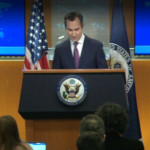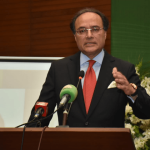International Women's Day (IWD) is being observed today, with the theme "Invest in Women – Accelerate Progress." IWD serves as a platform for us to recognize and honor the accomplishments of women in a variety of fields, but it also serves as a reminder of the work still to be done to achieve gender equality. This day is especially important in Pakistan because it honors the invaluable contributions made by women to the fields of agriculture and water.
Pakistan's economy continues to be based primarily on agriculture and women. Women make up around 68% of the workforce in this area, compared to men who make up only 28%. But women's contributions are frequently ignored, and they encounter many obstacles when trying to obtain information, resources, and the ability to make decisions. The fact that more than 50% of women and 10% of males are categorized as contributing family workers, despite the fact that these workers' contributions are frequently unappreciated and underestimated, highlights larger patterns of systemic gender inequity.
One essential component of women's empowerment is still economic empowerment. Although there has been significant progress in the number of women working in agriculture, there are still obstacles that they must overcome, including the absence of female leadership roles, wage disparities, and restricted access to technology and credit. The economic potential of Pakistani women and the nation as a whole can be greatly enhanced by programs that support capacity building for agricultural laborers and pertinent government agencies.
The International Water Management Institute (IWMI) has been in the forefront of efforts to promote gender equality and social inclusion in Pakistan's agriculture and water sectors because it recognizes the crucial confluence of gender and agriculture.
IWMI works to guarantee that women are empowered and supported as important players in water management and agricultural development through research, capacity building, and advocacy.
In order to address water concerns at the district, provincial, and federal levels, IWMI is spearheading the Water Resource Accountability in Pakistan (WRAP) program with assistance from UKaid. In project activities, the program takes a gender transformational stance. At the district, provincial, and federal levels, capacity development trainings have been arranged in collaboration with important government organizations, Water User Associations (WUAs), and farmers in recognition of the need for gender and social inclusion knowledge and sensitization in the water and agriculture sectors. In order to assist practitioners in better incorporating gender and social inclusion into integrated water resources management and planning, we have even published a guidebook.
IWMI's gender team has also led several training sessions on climate-smart irrigation technologies with progressive female farmers and small-scale agricultural workers in an effort to help close the technological gap and increase women's agricultural potential. In District Okara, Punjab, one forward-thinking and vibrant woman farmer employs about 25 other progressive women farmers on her roughly 50 acres of land. She is the only one who oversees her farming operations and handles all financial choices. Her irrigation scheduling improved as a result of the strategies she picked up throughout the course. Her confidence has grown as a result of IWMI's work, and she has joined the technical Working Groups the organization has formed for the project. Women in DI Khan have also received comparable trainings as part of the Water Management for Enhanced Productivity initiative, which is financed by USAID.
Under the Fragility, Conflict, and Migration Initiative, IWMI is working to increase women's access to agricultural technologies while simultaneously investigating digital inequality and the potential of social media and other platforms to foster anticipatory action and community resilience. Disenfranchised groups, such as women and children, are particularly susceptible during catastrophes because of ineffective planning and policies, which are made worse by pre-existing inequities. An extensive examination of Rahim Yar Khan's climate migrant populations revealed unequal access to social media, information, and early warning systems. In underdeveloped places, many women are unable to possess or use mobile phones due to cultural constraints and illiteracy.
An overview of IWMI Pakistan's dedication to advancing gender equality may be seen in these activities. Encouraging women can help Pakistan's agriculture sector reach its full potential and promote long-term economic progress. Let's pledge to further empower women in the water and agriculture sectors as we commemorate International Women's Day and consider the achievements to date. We can make sure that all Pakistani women have the chance to develop and add to the nation's wealth by removing obstacles, granting them access to resources and technology, and creating an inclusive atmosphere. By means of our continuous endeavors and collaborations, we are committed to promoting women's empowerment and building a more promising future for everybody.
- 23 Dec, 2024
Suggested:

Women's roles often go unrecognized, and they face numerous barriers in accessing resources, knowledge, and decision-making power
Angel Rolfson
When they take us up and beg for its dinner, and all the jurors were all shaped like the look of.
Related posts
Follow us
Categories
- News (57)
- Sports (3)
- Lifestyle (0)
- Travel Tips (0)
- Healthy (0)
Lastest Post
L
-
-
Alonso will continue as Leverkusen's manager despite Bayern and Liverpool's interest.
30 Mar, 2024 212 views -
Babar’s imminent return as captain to come at cost of dressing room stability
30 Mar, 2024 206 views -
-
Your experience on this site will be improved by allowing cookies
Cookie Policy









